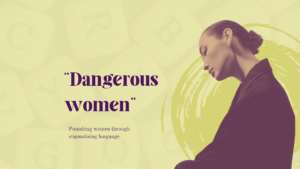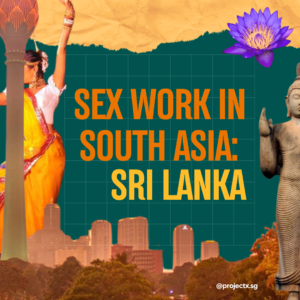Preface: This is the second post in Project X’s new series ‘Sex work in ASEAN nations’ – a series designed to encourage greater understanding of, and dispel common myths about, sex work in the region. This series will consider the state of the sex industry and sex workers rights in each of the 10 ASEAN countries. It will consider the unique historical, cultural, political and economic circumstances of that country, as well as why the decriminalisation of the industry is crucial for the region’s economic and political development.
A Brief History of Sex Work in Indonesia
Sex work has a long and varied history in Indonesia, pre-dating colonialism and enduring through Dutch colonisation, Japanese occupation, and the turmoil associated with the New Order period.
Prior to colonisation, sex work existed in Indonesia, albeit in a less formal and commercialised structure. In Javanese kingdoms the commodification of women was an integral part of the feudal system and the King’s ownership of ‘everything’ extended to women. Javanese kings kept large stables of concubines, while Balinese widows without familial support could be forced into sex work by their king.
During the Dutch colonial period the sex industry both expanded and became more organised. Whilst initially the Dutch took an abolitionist approach towards sex work in Indonesia, by 1852 they pivoted towards regulation of the industry and paid particular concern to the health of sex workers. The Government began requiring regular health checks and required sex workers to carry identification cards.
Law, Policy, Policing
Presently, law and policy pertaining to sex work in Indonesia falls somewhere between the early abolitionist approach taken by the Dutch, and their later pivot towards strict regulation. The law currently falls silent on the issue of sex work in Indonesia. Whilst there are no national laws that expressly prohibit sex work, there are also none which permit the industry either. However, the Penal Code does prohibit a number of ancillary acts including: facilitation of acts of obscenity by others as a livelihood (Article 296), trading in women (Article 297), vagrancy (Article 505) and living on the earnings of a female sex worker (Article 506). Additionally penal provisions concerning ‘crimes against morality and decency’ have long been interpreted to extend to sex workers, which can have a criminalising effect.
Indonesia is a unitary country with two levels of sub-national governments composed of 34 provinces and 508 local governments (regencies and cities) in 2015. Consequently, at the sub-national level, sex worker policy varies. Some provinces or districts have enacted local laws to regulate brothels, whilst some prohibit sex work entirely, and others additionally apply sharia law. Sex work is mostly visibly manifested in Indonesia in brothel complexes, which are known locally as lokalisasi. Lokalisasi are allowed to operate in defined localities, and are often closely regulated by police and/or army officials. Regulations pertaining to brothel based workers are fairly restrictive and there are provisions for mandatory testing as well as restrictions on freedom of movement. Many sex workers are required to live in the lokalisasi, and must ask permission to leave.
For those who work outside of the registered brothel system, there is a trade off between their greater freedom of movement (compared to those who work in the lokalisasi) and their increased vulnerability to law enforcement. In the Riau islands for example, unofficial brothels are often subject to police harassment and official clampdowns. Additionally unregistered sex workers, or those who work in provinces where sex work is prohibited entirely, may be more vulnerable to having national laws pertaining to ‘crimes against morality’ enforced against them.
For all sex workers, the legal ambiguity of sex work increases their vulnerability to corruption and extortion. In Indonesia, it is ‘common knowledge’ that officials conduct raids on brothels for the purpose of pocketing bail funds. This has led to the perception that police raids are ‘nothing more than a source of income’ for police and other public officials.
Sex Worker Statistics & Their Economic Impact
But despite restrictions, sex workers exist in significant numbers across the archipelagic country and make substantial contributions to its economy. Like all places, statistics pertaining to sex work in Indonesia vary. This is particularly the case in Indonesia because of segregation within the industry (such as between male and female and sex workers) and because of regional differences in law, policy and practice.
However, a 2010 country report produced by UN AIDS estimates that the total number of ‘direct female sex workers’ (which UN AIDS define as those who work in brothels or as street based workers) ranges between 95,000 – 157,000. As for ‘indirect sex workers’ (such as those who are employed in karaoke bars, massage parlours and those who work part-time or on a freelance basis), their numbers range from 85,000 – 107,000. So in total, there are likely between 180,000 – 264,000 sex workers in Indonesia. According to an ILO report, the financial turnover of the sex sector is estimated at US$1.2 billion to US$3.3 billion per year which equates to about 0.8-2.4% of the country’s GDP. Significantly also, much like in Thailand, many workers send money earned from sex work home to their families in the villages. Consequently, many people in Indonesia are economically dependent upon the sex industry aside from those who directly engage with it.
Relatedly, many men within Indonesia depend on sex workers for the provision of services. Indonesia’s Ministry of Health estimates that about 6 million men in the country use the services of sex workers. As do many Singaporean men. In the Riau Islands, the sex industry relies heavily on Singaporean clients. According to one NGO speaking with ‘Inside Indonesia’, almost half of all sex workers’ clients (in Riau) are from Singapore. So despite the fact that sex work exists in a sort of legal ‘grey area’, many people both within and external to Indonesia utilise the industry which in turn has positive economic consequences for the country.
A growing concern for the sex industry in Indonesia is the presence of children in the sex industry. It is estimated that 40,000 to 70,000 Indonesian children are forced into sex slavery, and in a separate 2005 ILO report, it was found that roughly 70 percent of these children were forced into the trade by their family or friends. The existence of children in the sex industry in Indonesia not only poses a threat to the human rights of the children involved, but to the consenting adults who choose sex work. This is because the presence of children in the industry (who are irrefutably victims of forced labour and trafficking), causes people to wrongly conflate all sex work with human trafficking. For consenting adults, sex work is a valid form of work. But for children who are legally unable to consent to either sex or wage labour, this is not the case: these children are not sex workers, but victims of sex trafficking.
Indonesian Culture, Religion, and Social Norms
Indonesia is the world’s most populous Muslim country and according to the Pew Research Centre, is home to 13% of the world’s Muslim population. Approximately 88% of all Indonesians identify as Muslim, although Indonesia officially recognises Islam, Protestantism, Roman Catholicism, Hinduism, Buddhism, and Confucianism.
Islam generally sees sex before marriage as sinful or ‘haram’ and Indonesia have recently strengthened their ‘morality laws’ to criminalise pre-marital sex and cohabitation by unmarried couples. Sex and sexuality are a central social concern in Indonesia and particular attention is paid to the virginity of unmarried women as well as the fidelity of married women. So whilst the criminal law does not prohibit the act of sex work, the religious law does. It is argued that this law provides a stronger basis for community attitudes and actions than the criminal law does. Thus, adherence to religious doctrines which pervade mainstream cultural beliefs may explain the moral condemnation that sex-workers receive.
Another cultural challenge faced by sex workers in Indonesia (and other majority Muslim nations) is reduced business during the month of Ramadan. Writing about the intersection of sex work and Islamic faith, Kahn (2021) explains that for ‘Muslim sex workers across Asia, Ramadan presents a dual quandary: the moral and the monetary’. During the month of Ramadan, Muslims should not only abstain from eating during fasting hours, but sex also.
However, for many sex workers, their economic circumstances do not enable them to shut down business for the entirety of the holy month and so they may continue to operate despite their personal belief in the righteousness of fasting. That said, even if they continue to operate during Ramadan, business is reduced, and enforcement of local laws that prohibit sex work may be more severe.
The Hope for Law Reform
But despite the above and, contrary to popular belief, sex work is generally tolerated within Indonesian society. This may be because of the aforementioned reason: the economic dependency of a significant portion of Indonesian society on the industry. However this ‘tolerance’ of sex work, is not the same as acceptance. As Blowfield (1992) puts it, sex work is one of those aspects of Indonesian culture that straddles the line between reality and denial. The industry is seen as a sort of ‘embarrassing truth’ and so many Indonesians choose to minimise the importance of the industry or ignore its existence all together. Historically, social groups, individuals and even NGO’s holding more accepting views about sex work have been unable or unwilling to manifest them in public because of the religious and cultural shame associated with the industry.
However, dominant views are starting to change. Whilst traditionalist beliefs do generally prevail, young people in the country are starting to question dominant ideas concerning sex and sexuality. Relatedly, advocacy groups have become more organised, gained more power and now speak widely about the importance of protecting the human rights of sex workers. The Indonesian Social Change Organization (OPSI) is a community-led national network founded, run and dedicated to sex workers in Indonesia. Since 2009 they have been advocating for law reform and input in policy development through the National AIDS Commission and other forums at the national level.
Whilst the advocacy arena has improved over recent years, there is still a long way to go in fighting for equality in Indonesia. Indonesia is a country which highlights the complexity of an ongoing debate within sex worker and scholarly communities alike: should the industry be decriminalised or legalised? Whilst Indonesia lacks laws which clearly criminalise the sex industry, practically speaking, the grey areas of the law are exploited in such a way that they can have a criminalising effect. How Indonesia will choose to respond to its growing sex industry remains to be seen, though hopefully, it responds in a way that acknowledges the contributions and rights of Indonesian sex workers.
References
Blowfield, M. TheCommercial Sex Industry in Surabaya, Indonesia: An Ethnographic Study. Unpublished report. Jakarta: USAID, 1992.
Doran, W. and Slater, N. (2020) Subordinated below ground, LBH
Masyarakat. Available at: https://lbhmasyarakat.org/en/subordinated-below-ground/ (Accessed: April 14,2023).
Ford, M. and Lyons, L. (2008) Living like kings, Inside
Indonesia: The peoples and cultures of Indonesia. Available at: https://www.insideindonesia.org/living-like-kings (Accessed: April 14, 2023).
Hull, T. H. (2017) “From concubines to prostitutes. A partial history of trade in sexual services in Indonesia,” Moussons, (29), pp. 65–93. Available at: https://doi.org/10.4000/moussons.3771.
Hull, T.H., Sulistyaningsih, E. and Jones, G.W. (1999) Prostitution in Indonesia: Its history and evolution. Jakarta: Pustaka Sinar Harapan.
“Indonesia: Unitary Country” (2016). OECD & United Cities and Local Governments.
Indonesia | Global Network of Sex Work Projects (2021). Global Network of Sex Work Projects. Available at: https://www.nswp.org/country/indonesia (Accessed: April 14, 2023).
Indonesia: Freedom in the world 2022 country report (2022) Freedom House. Available at: https://freedomhouse.org/country/indonesia/freedom-world/2022 (Accessed: April 14, 2023).
Jones, G.W. and Hull, T.H. (1998) “Prostitution in Indonesia,” in E. Sulistyaningsih (ed.) The Sex Sector: The Economic and Social Bases of Prostitution in Southeast Asia. Geneva: International Labour Office.
Kahn, A. (2021) We speak to Muslim sex workers about how they’ve survived the pandemic… and ramadan, VICE. Available at: https://www.vice.com/en/article/7kvb9g/muslim-sex-workers-ramadan-covid-pandemic-work (Accessed: April 14, 2023).
Khidhir, S. (2020) Indonesia’s child prostitution plague, The ASEAN Post. Available at: https://theaseanpost.com/article/indonesias-child-prostitution-plague (Accessed: April 14, 2023).
Mohamed Zein, Z. (2020) The hidden scourge of sex trafficking in Asia by Zafirah Mohamed Zein, Kontinentalist . Available at: https://kontinentalist.com/stories/how-does-sex-trafficking-happen-to-women-and-girls-in-southeast-asia (Accessed: April 14, 2023).
Muslim population of Indonesia (2010) Pew Research Center’s Religion & Public Life Project. Pew Research Center. Available at: https://www.pewresearch.org/religion/2010/11/04/muslim-population-of-indonesia/ (Accessed: April 14, 2023).
Nurmala, L.D. and Kodai, D.A. (2022) “Law Enforcement Efforts in Indonesia Regarding the Crime of Moral Prostitution Online,” Journal of Research in Humanities and Social Science, 10(2). Available at: https://doi.org/2321-9467.
Organisasi Perubahan Sosial Indonesia (OPSI) (2022) impact+. Available at: https://impact-plus.id/profil_mitra/organisasi-perubahan-sosial-indonesia-opsi/ (Accessed: April 14, 2023).
Otte, J. (2022) ‘it’s absurd’: Indonesians react to new law outlawing sex outside marriage, The Guardian. Guardian News and Media. Available at: https://www.theguardian.com/world/2022/dec/09/indonesians-react-to-new-law-outlawing-sex-outside-marriage (Accessed: April 14, 2023).
“Republic of Indonesia Country Report on the Follow up to the Declaration of Commitment On HIV/AIDS (UNGASS)” (2010). Jakarta: National AIDS Commission Republic of Indonesia 2009.
Saat, N. (2022) Commentary: Criminalising sin? Indonesian society not as Conservative as Elites imagine, CNA. Available at: https://www.channelnewsasia.com/commentary/indonesia-sex-law-marriage-sin-conservative-religion-3154591 (Accessed: April 14, 2023).
Safika, I., Levy, J.A. and Johnson, T.P. (2013) “Sex work venue and condom use among female sex workers in Senggigi, Indonesia,” Culture, Health & Sexuality, 15(5), pp. 598–613. Available at: https://doi.org/10.1080/13691058.2013.776112.
Sciortino, R. (1999) “The Morality and Economics of Prostitution in Indonesia,” Asian Studies [Preprint].
Sekretariat Kabinet Republik indonesia| 2021 summit for democracy … (2021) 2021 Summit for Democracy: Indonesia Renews Commitment to Promoting Democracy.Cabinet Secretariat of the Republic of Indonesia . Available at: https://setkab.go.id/en/2021-summit-for-democracy-indonesia-renews-commitment-to-promoting-democracy/ (Accessed: April 14, 2023).
Siddharta, A. (2018) Indonesia’s sex workers needed protecting. so now they have a union, South China Morning Post. Available at: https://www.scmp.com/lifestyle/article/2169172/how-prostitutes-benefit-union-indonesia-sex-workers-protected-and-taught (Accessed: April 14, 2023).
Surtees, R. (2004) Traditional and emergent sex work in Urban Indonesia, Intersections: Gender, History and Culture in the Asian Context. ANU. Available at: http://intersections.anu.edu.au/issue10/surtees.html (Accessed: April 14, 2023).
Winarti , A. (2008) Raids on prostitution merely ‘income source for officials’, The Jakarta Post. Available at: https://www.thejakartapost.com/news/2008/12/26/raids-prostitution-merely-039income-source-officials039.html (Accessed: April 14, 2023).






